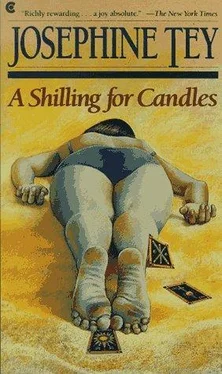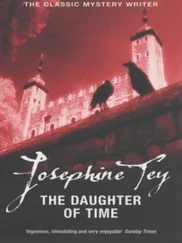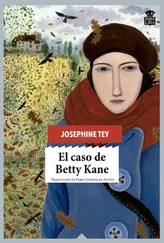Josephine Tey - A Shilling for Candles
Здесь есть возможность читать онлайн «Josephine Tey - A Shilling for Candles» весь текст электронной книги совершенно бесплатно (целиком полную версию без сокращений). В некоторых случаях можно слушать аудио, скачать через торрент в формате fb2 и присутствует краткое содержание. Год выпуска: 1936, Жанр: Классический детектив, на английском языке. Описание произведения, (предисловие) а так же отзывы посетителей доступны на портале библиотеки ЛибКат.
- Название:A Shilling for Candles
- Автор:
- Жанр:
- Год:1936
- ISBN:нет данных
- Рейтинг книги:4 / 5. Голосов: 1
-
Избранное:Добавить в избранное
- Отзывы:
-
Ваша оценка:
- 80
- 1
- 2
- 3
- 4
- 5
A Shilling for Candles: краткое содержание, описание и аннотация
Предлагаем к чтению аннотацию, описание, краткое содержание или предисловие (зависит от того, что написал сам автор книги «A Shilling for Candles»). Если вы не нашли необходимую информацию о книге — напишите в комментариях, мы постараемся отыскать её.
A Shilling for Candles — читать онлайн бесплатно полную книгу (весь текст) целиком
Ниже представлен текст книги, разбитый по страницам. Система сохранения места последней прочитанной страницы, позволяет с удобством читать онлайн бесплатно книгу «A Shilling for Candles», без необходимости каждый раз заново искать на чём Вы остановились. Поставьте закладку, и сможете в любой момент перейти на страницу, на которой закончили чтение.
Интервал:
Закладка:
"A collector, your fiance. An expensive hobby, I've always understood." He put the passports into his pocket.
"You can't do that. They're not yours. I'll scream the house down. I will say you came in and attacked me. Look!" She pulled her wrap open and began to tear her nightdress.
"Scream as much as you like. Your old lady would be very interested in these passports. And if you have any designs on the old lady, by the way, I should advise you to reconsider them. Now I shall retrieve my boots. They are lying somewhere in the garden. Though God alone knows if my feet will go into them. My advice to you, Mrs. Cairns Black, is to do nothing at all until you hear from me. We have nothing against you , so far, so don't begin putting ideas into our heads by doing anything you might regret."
Chapter 23
Grant managed to get his boots on (by dint of thinking strenuously of something else, his childhood's recipe for painful moments), but after two or three steps hastily took them off again, and hobbled homeward as he had come: stocking-soled. It was not easy to find his way back, but he had an excellent bump of locality (it was said at the Yard that if you blindfolded Grant and turned him until he was dizzy he still knew where north was) and the general direction was clear enough to him. He stood in a doorway on the opposite side of the street and watched the officer on the beat go by, rather than ask a direction and have to explain himself. No member of the C.I.D. likes to appear before a borough policeman with his boots in his hands.
He wrote a note asking Williams to telephone the Yard when he came in at six and ask for any information they might have about a sect or order or whatnot called the Tree of Lebanon, and to waken him when the answer came. He then fell into bed, and slept dreamlessly, the passports under his pillow until Williams called him just before ten o'clock.
"News of Tisdall?" Grant said as his eyes opened.
But there was no news.
The Yard said that the Holy Order of the Tree of Lebanon had been founded by a rich bachelor in 1862, for the furtherance of the monastic life, he having been what was then known as jilted by the object of his affections. He himself had been the first prior, and all his wealth had been used to endow the foundation. The rule of poverty had been very strict, money being used only for charities approved by the prior of the moment, so that by the present day the order had the reputation of having a lot of money laid away. A prior was nominated by his predecessor, but a prior could be superseded at any moment by the unanimous vote of the brethren.
Grant drank the horrible coffee supplied by the establishment, and considered things. "That is what our Herbert wants: the prior-ship. He has the prior dancing on a stick. It's almost incredible that a man like the prior could be such a fool. But then! Think of the fools we've known, Williams."
"I'm thinking, sir," Williams said, eloquently.
"All those hardheaded self-made pieces of original conglomerate who fall for a few honeyed words from a confidence man in a hotel lobby! And of course Herbert has no ordinary gift of tongues. Perhaps he worked his churches in America as leaven to the prior's interest. Anyhow, he's the prior's fair-haired boy at the moment. With the prospect of having a fortune in his hands if he plays his cards rightly for the next few weeks. Not much wonder he was scared of getting in wrong. He wanted to know just how much his sister had left him, without compromising himself with his brethren. If she had left him enough to make it worth his while, he'd give up the monastic life. I shouldn't think it appeals greatly to him. Even with occasional visits to the villa."
"How long do you think he'd stay in any case, sir?"
"Till he had transferred enough hard cash to his own particular charities. Oh, well, these," he indicated the passports, "will be enough to frame a nice little indictment on, so that we can have him under our hands when we want him. The thing that disappoints me, Williams, is where is the murder in all this? I don't mean that he didn't do it. I've no doubt that he was having his twenty-four hours off at the time. But why did he do it? He came to England when he heard that she was coming. I think, judging by his woman's clothes, that he was possibly broke when he arrived. That was why he took to the Tree of Lebanon. But the possibilities of the Tree must have occurred to him pretty soon. Why kill his sister?"
"Went to see her and had a quarrel. The queer hour that's puzzled us all would be quite normal for him. Six o'clock would be just as usual as lunchtime."
"Yes, that's true. I'm going now to find out from the Reverend Father whether Brother Aloysius was out of the monastery a fortnight yesterday. The Reverend Father would have sat on a very high horse yesterday, but he'll talk when he sees what his favorite looks like on these passports."
But the Reverend Father was not receiving callers. The little guichet displayed the sour face of the doorkeeper, who delivered his stolid message in answer to all Grant's questions, whether the phrase was relevant or not. Herbert's golden tongue had been at work. The guichet shut, and Grant was left helpless in the little lane. There was nothing for it but a warrant. He went slowly away, his feet still aching; admired the job Herbert had made of oiling the cellar entrance in the pavement, and climbed into his car. Yes, he had better get that warrant.
He went back to the hotel for his pajamas, razor, and toothbrush (he had no intention of spending another night there) and was leaving a message for the sleeping Williams, when he was called to the telephone by the Yard.
Would he go to Dover? The man there wanted him. Something had turned up, it seemed.
He changed the message for Williams, threw his things into the car, found time to wonder why he overtipped the frowsy virago for her inattendance, disgusting food, and deplorable cooking, and set out for Dover.
Something had turned up. That could only mean Champneis. Something out of the ordinary. If they had merely found where Champneis had spent the night, it would have been reported by telephone in the ordinary way. But — something had turned up.
Rimell, the detective in charge — a kind, melancholy-looking boy, whose greatest asset was his unlikeness to the popular conception of a detective — was waiting for Grant at that police-station door, and Grant drew him into the car. Rimell said that he had, after endless delving, unearthed an old fellow called Searle, a retired deckhand, who had been coming home from his grand-daughter's engagement party about half past twelve on the Wednesday night — or rather, the Thursday morning. He was alone, because very few people lived down the harborway nowadays. They'd got ideas and lived up the hill in gimcrack villas you'd be afraid to sneeze in. He had stopped a minute or two when he had got to the sea level, to look at the harbor. It still made him feel fine to look at riding lights at night. It was beginning to mist over, but it was still clear enough to see the outlines of everything. He knew the Petronel was coming in — had seen her through his glasses before he went to the party — and so he looked for her now, and saw her lying not at the jetty, but out in the water at anchor. As he watched, a small motorboat came out from her side and made for the shore, going slowly with a quiet chug-chug as if not anxious to call attention to itself. As it touched the jetty steps a man moved out of the shadows by the quay. A tall figure whom Searle identified as Lord Edward (he had seen him often and had in fact once served aboard a previous yacht of his brother's) appeared from the boat and said, "Is that you, Harmer?" and the smaller man had said, "It's me," and then, in a low tone, "Customs all right?" Lord Edward had said, "No trouble at all," and they had gone down into the motorboat together and pushed off. The mist had come down quickly after that, blotting out the harbor. After about fifteen minutes Searle had gone on his way. But as he was going up the street, he heard a motorboat leave the Petronel . Whether it came ashore or went out of the harbor he didn't know. He didn't think at the moment any of all this was of any importance.
Читать дальшеИнтервал:
Закладка:
Похожие книги на «A Shilling for Candles»
Представляем Вашему вниманию похожие книги на «A Shilling for Candles» списком для выбора. Мы отобрали схожую по названию и смыслу литературу в надежде предоставить читателям больше вариантов отыскать новые, интересные, ещё непрочитанные произведения.
Обсуждение, отзывы о книге «A Shilling for Candles» и просто собственные мнения читателей. Оставьте ваши комментарии, напишите, что Вы думаете о произведении, его смысле или главных героях. Укажите что конкретно понравилось, а что нет, и почему Вы так считаете.












